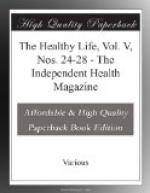Regular readers will recognise in this article a continuation of the series previously entitled “Healthy Brains.” The author of “The Children All Day Long,” is an intimate disciple of one of the greatest living psychologists, and she has a message of the first importance to all who realise that true health depends as much on poise of mind as on physical fitness. We regret that in the previous article, “Imagination in Play,” the following misprints occurred:—P. 475, line 4 from top, “movement” should be “moment”; p. 475, line 5 from bottom, “admiration” should be “imagination."—[EDS.]
Some people are given to excusing their own uncharitable thoughts by saying, “I suppose I ought not to have minded her rudeness; I am afraid I am too sensitive.” In the same way, people say, “Oh, I couldn’t sleep in the house alone” (or let a child go on a water-picnic, or nurse a case of delirium or do some other thing that suggested itself), “I have too much imagination.” In both cases the claim, though put in deprecating form, is made complacently enough. The correlative is: “You are so sensible, dear; I know you won’t mind,” which is a formula under cover of which many kindnesses may be shirked and many unpleasant duties passed on.
The sensible, practical people who listen to these sayings sometimes attach importance to them, so that a habit has grown up of describing morbidly neurotic people as “over-sensitive” and cowardly ones as “too quick of imagination.” Ultimately, this leads to the thought that both sensitiveness and imagination are mental luxuries too costly for ordinary folk to grow, and that it is safest to check, crush or uproot them when we discover them springing up in others or in ourselves.
Is not this attitude of mind due to a misunderstanding? Imagination is an organ of activity; it can be kept in the highest possible condition of health by having plenty of exercise; it should be working continually against resistance. A rabbit’s gnawing tooth, if the opposing tooth be broken, may grow inwards and cause the creature’s death, but the same activity of growth, if working under suitable conditions, enables him to go on living and gnawing at his food year after year without wearing his tools away.
The problem, then, in economy of effort is: How shall we use whatever force of sensitiveness and imagination we have, so as to get its maximum efficiency of usefulness and its minimum pain and inconvenience?
For many ages man has been dominated by fear. His way to freedom, now, is to step out through his cobweb chains and go right forward with courage and in faith. So we are told with relentless and almost tiresome reiteration. It is the fashion, one might almost say, to have cast off fear, and the one thing an honest “modern thinker” is afraid of is being afraid. (To less honest ones




